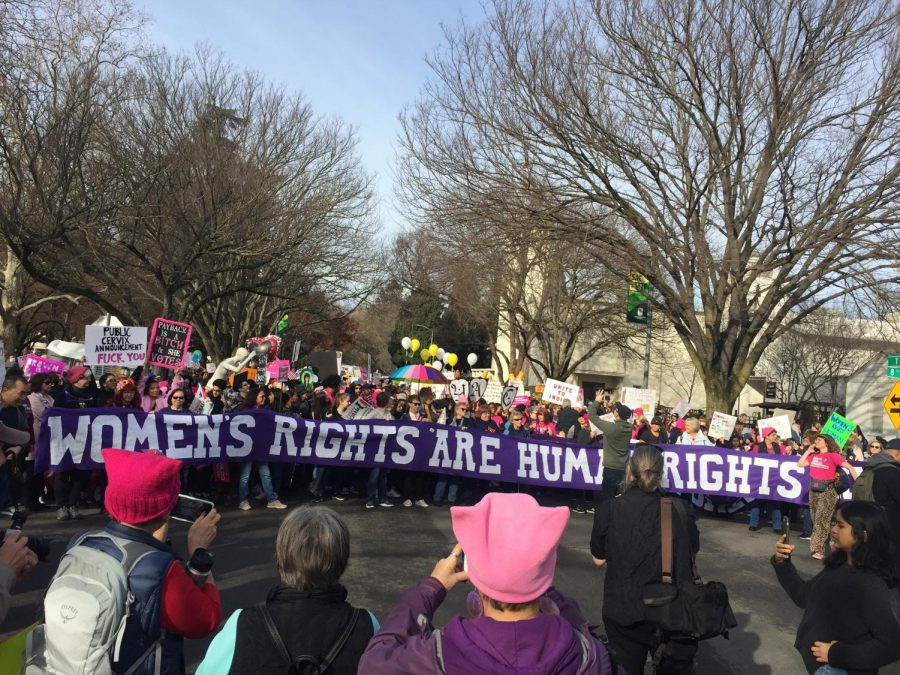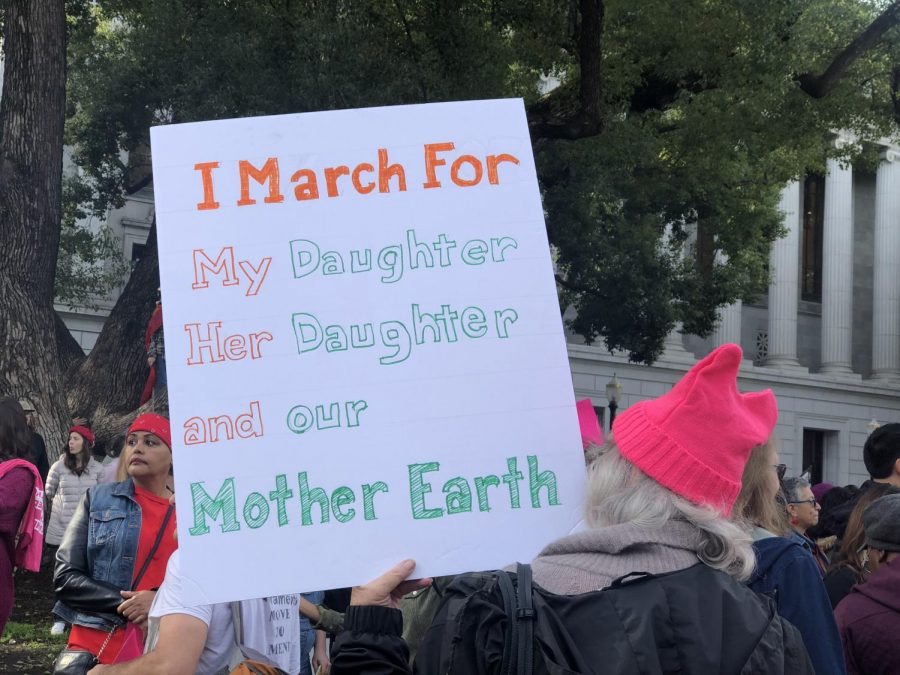2019 Women’s March gathers organizations in support of women’s issues
Thousands gathered in Sacramento on Saturday to take part in the 2019 Women’s March
Will Coburn – The State Hornet
Demonstrators rally at the corner of T st and 7th St. before marching to the Capitol. The slogan “Women’s Rights are Human Rights has its roots going back to the 1800s but was popularized by a speech Hilary Clinton gave in 1995.
Demonstrators from a diverse array of backgrounds and organizations rallied in solidarity for women’s issues at the 2019 Women’s March in Sacramento on Saturday morning.
Attendees left from Southside Park at 10 a.m. and made their way to the steps of the State Capitol, where a rally was held by Women’s March Sacramento.
Among the speakers at the rally was the president for the Capitol Chapter of the California Faculties Association, Margarita Berta-Avila.
“Well we wanted to make a statement of standing in solidarity of standing with the women’s march,” said Berta-Avila.
Berta-Avila emphasized the importance of solidarity between social movements like the Women’s March, Black Lives Matter and Brown Issues.
Berta-Avila also said that most speakers at the rally weren’t just talking about the policies or behavior of President Donald Trump, but broader structural issues in government that allow for racist or misogynistic policies to happen.
“We have to push back and we have to let the legislature know that we’re not going to stand for that, and they need to be representing the people, and this needs to happen at a local level, and nationally and statewide,” Berta-Avila.
Towards the end of Berta-Avila’s speech, a short column of protestors marched and chanted behind the main stage. Alma Lopez, an activist with Brown Issues, was an organizer of the Women of Color Contingent.
Lopez said the action aimed to recognize the work of local activism by women of color and to show support for Berta-Avila, whom she said acknowledged the importance of such community organizers.
“Part of all this has to do with just the Sacramento Women’s March not being women-of-color-friendly, and just previous stories from our compañeras who have felt ostracized or silenced,” she said.
According to Lopez, a number of local organizers familiar with social issues specific to Sacramento were not included in the organization of the Sacramento Women’s March.
“I’d say, we would think that the main organizers of the communities that have been involved in this struggle, in our communities, would be brought to the table,” Lopez said. “We didn’t know who the organizers were, we didn’t know anything about it.”
Edith Williams, who was a participant in the Women of Color Contingent (WCC), said most of the WCC demonstrators in the brief action were high schoolers involved with Brown Issues, an organization that seeks to promote civic engagement and solve issues facing communities of color.
Assemblymember Kevin McCarty said he attended the event to show support for his daughters.
“I care about issues that impact women in our country and in California. I just wanted to support this march and the diversity of issues that occur,” McCarty said. “The common denominator is how these issues impact women and the future of women, the future of my ten year old twin girls.”
Jannah Khalil, a journalism student at Sac State, said she came to the march to “blow off some steam.”
“It’s been a whirlwind politically, so I’m just kind of here to be with people who are tired of what’s going on and really want to make a change,” Khalil said. “Personally I’m just trying to make sure that I keep up with what’s going on and help where I can and spread the message. Spread what’s going on, what’s right – what other people can to do make a change.”
Kevin Wehr, a sociology professor at Sac State, also attended the march. He said that he is active in his union, the California Faculty Association.
“Our union is standing in support of the women’s march, we are comprised of many strong intelligent female faculty,” Wehr said. “We’re here to support them and everybody else.
“As a union, we stand with our students who are without documentation, we have faculty and staff that are without documentation and we stand in support of them.”
Elizabeth Wells, an activist with Planned Parenthood Affiliates of California, said she sees the administration’s policies as attacks on Roe v. Wade and compared the possible removal of mandatory coverage of birth control to an outright ban.
“Roe v. Wade continues to be under truly, truly dire threat,” Wells said. “So you can see (the threat to) even basic healthcare like birth control access.”
Those threats on women’s health issues lead to Wells and Planned Parenthood bringing their staff, volunteers and educators to the Women’s March, Wells said.
“We’re out here supporting reproductive and sexual healthcare, gender equity support of immigrants standing up for black lives and trans lives really standing up for all the intersections that come with advocating for women’s rights,” Wells said.
Storm Ray, Will Coburn, Ashton Byers and Camille Escovedo contributed to this report.
Your donation will support the student journalists of Sacramento State University. Your contribution will allow us to purchase equipment and cover our annual website hosting costs.






























































































































